pep六年级英语下学期必会过去式比较级
- 格式:doc
- 大小:17.50 KB
- 文档页数:1
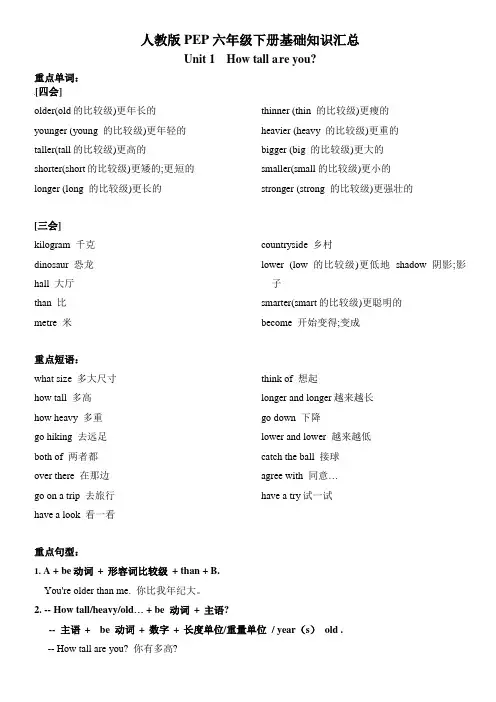
人教版PEP六年级下册基础知识汇总Unit 1 How tall are you?重点单词:[四会]older(old的比较级)更年长的younger (young 的比较级)更年轻的taller(tall的比较级)更高的shorter(short的比较级)更矮的;更短的longer (long 的比较级)更长的thinner (thin 的比较级)更瘦的heavier (heavy 的比较级)更重的bigger (big 的比较级)更大的smaller(small的比较级)更小的stronger (strong 的比较级)更强壮的[三会]kilogram 千克dinosaur 恐龙hall 大厅than 比metre 米countryside 乡村lower (low 的比较级)更低地shadow 阴影;影子smarter(smart的比较级)更聪明的become 开始变得;变成重点短语:what size 多大尺寸how tall 多高how heavy 多重go hiking 去远足both of 两者都over there 在那边go on a trip 去旅行have a look 看一看think of 想起longer and longer越来越长go down 下降lower and lower 越来越低catch the ball 接球agree with 同意…have a try试一试重点句型:1.A + be动词+ 形容词比较级+ than + B.You're older than me. 你比我年纪大。
2. -- How tall/heavy/old… + be 动词+ 主语?-- 主语+ be 动词+ 数字+ 长度单位/重量单位/ year(s)old .-- How tall are you? 你有多高?-- I'm 1. 65 metres. 我身高1. 65米。
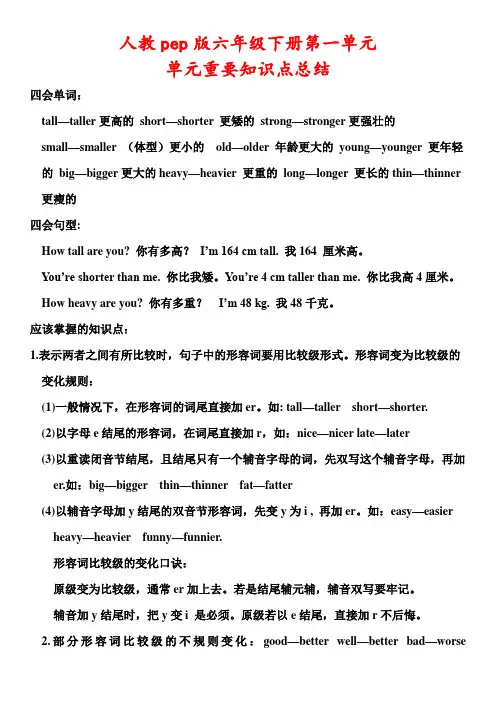
人教pep版六年级下册第一单元单元重要知识点总结四会单词:tall—taller更高的short—shorter 更矮的strong—stronger更强壮的small—smaller (体型)更小的old—older 年龄更大的young—younger 更年轻的big—bigger更大的heavy—heavier 更重的long—longer 更长的thin—thinner 更瘦的四会句型:How tall are you? 你有多高?I’m 164 cm tall. 我164 厘米高。
You’re shorter than me. 你比我矮。
You’re 4 cm taller than me.你比我高4厘米。
How heavy are you? 你有多重?I’m 48 kg. 我48千克。
应该掌握的知识点:1.表示两者之间有所比较时,句子中的形容词要用比较级形式。
形容词变为比较级的变化规则:(1)一般情况下,在形容词的词尾直接加er。
如: tall—taller short—shorter.(2)以字母e结尾的形容词,在词尾直接加r,如:nice—nicer late—later(3)以重读闭音节结尾,且结尾只有一个辅音字母的词,先双写这个辅音字母,再加er.如:big—bigger thin—thinner fat—fatter(4)以辅音字母加y结尾的双音节形容词,先变y为i , 再加er。
如:easy—easierheavy—heavier funny—funnier.形容词比较级的变化口诀:原级变为比较级,通常er加上去。
若是结尾辅元辅,辅音双写要牢记。
辅音加y结尾时,把y变i 是必须。
原级若以e结尾,直接加r不后悔。
2.部分形容词比较级的不规则变化:good—better well—better bad—worsebadly—worse many—more much—more little—less far—farther3.同义句:How tall are you?=What’s your height?How heavy are you?=What’s your weight?4.以How开头的问句(仅限小学阶段):How are you? 问身体状况。
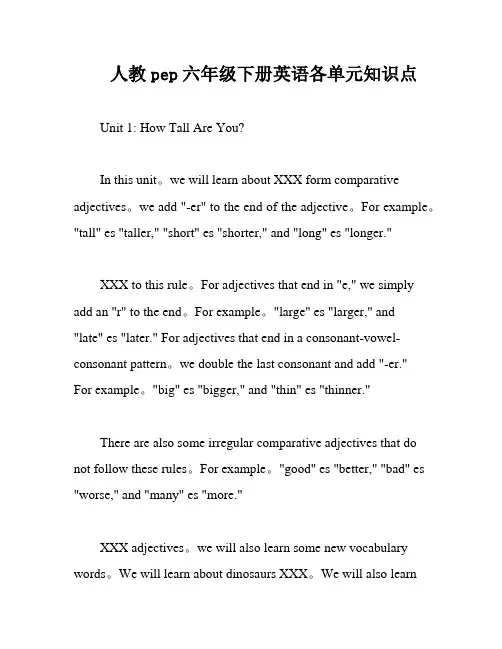
人教pep六年级下册英语各单元知识点Unit 1: How Tall Are You?In this unit。
we will learn about XXX form comparative adjectives。
we add "-er" to the end of the adjective。
For example。
"tall" es "taller," "short" es "shorter," and "long" es "longer."XXX to this rule。
For adjectives that end in "e," we simply add an "r" to the end。
For example。
"large" es "larger," and "late" es "later." For adjectives that end in a consonant-vowel-consonant pattern。
we double the last consonant and add "-er."For example。
"big" es "bigger," and "thin" es "thinner."There are also some irregular comparative adjectives that do not follow these rules。
For example。
"good" es "better," "bad" es "worse," and "many" es "more."XXX adjectives。
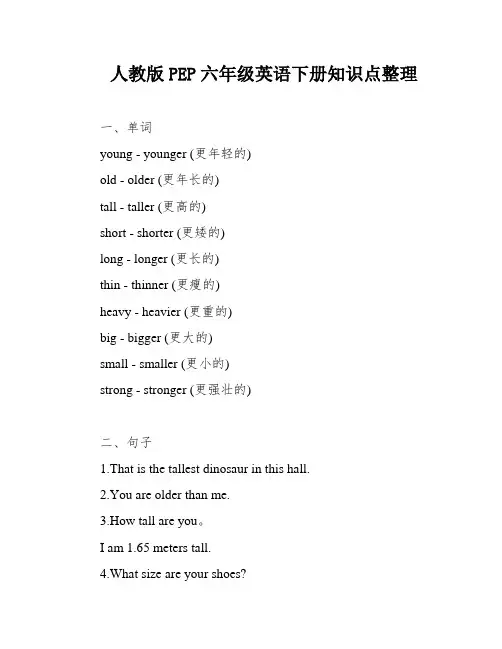
人教版PEP六年级英语下册知识点整理一、单词young - younger (更年轻的)old - older (更年长的)tall - taller (更高的)short - shorter (更矮的)long - longer (更长的)thin - thinner (更瘦的)heavy - heavier (更重的)big - bigger (更大的)small - smaller (更小的)strong - stronger (更强壮的)二、句子1.That is the tallest dinosaur in this hall.2.You are older than me.3.How tall are you。
I am 1.65 meters tall.4.What size are your shoes?5.My shoes are size 37.6.Your feet are bigger than mine.7.How heavy are you?8.I weigh 48 kilograms.三、语法复要点形容词的比较级1.形容词比较级用于比较两个事物或人,通常跟着than。
2.形容词加er的规则:一般在词尾加er;以字母e结尾,加r;以一个元音字母和一个辅音字母结尾,应双写末尾的辅音字母,再加er;以“辅音字母+y”结尾,先把y变i,再加er。
3.不规则形容词比较级:good/well - better一、单词clean - cleaned (打扫)stay - stayed (停留)wash - washed (洗)二、句子无明显问题的段落三、语法复要点过去式的构成1.一般情况下,在动词后加ed。
2.以e结尾的动词,在其后加d。
3.以辅音字母+y结尾的动词,先变y为i,再加ed。
4.以重读闭音节结尾的动词,且末尾只有一个辅音字母时,双写这个辅音字母,再加ed。
5.不规则动词的过去式需要单独记忆。
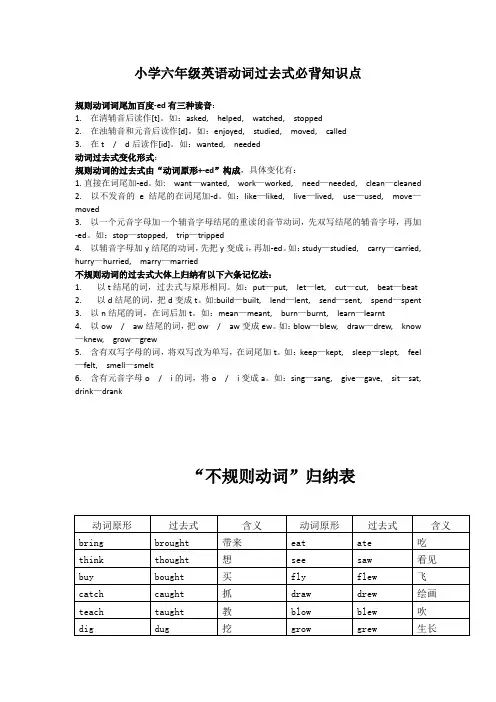
小学六年级英语动词过去式必背知识点规则动词词尾加百度-ed有三种读音:1.在清辅音后读作[t]。
如:asked,helped,watched,stopped2.在浊辅音和元音后读作[d]。
如:enjoyed,studied,moved,called3.在t/d后读作[id]。
如:wanted,needed动词过去式变化形式:规则动词的过去式由“动词原形+-ed”构成,具体变化有:1.直接在词尾加-ed。
如:want—wanted,work—worked,need—needed,clean—cleaned2.以不发音的e结尾的在词尾加-d。
如:like—liked,live—lived,use—used,move—moved3.以一个元音字母加一个辅音字母结尾的重读闭音节动词,先双写结尾的辅音字母,再加-ed。
如:stop—stopped,trip—tripped4.以辅音字母加y结尾的动词,先把y变成i,再加-ed。
如:study—studied,carry—carried, hurry—hurried,marry—married不规则动词的过去式大体上归纳有以下六条记忆法:1.以t结尾的词,过去式与原形相同。
如:put—put,let—let,cut—cut,beat—beat2.以d结尾的词,把d变成t。
如:build—built,lend—lent,send—sent,spend—spent3.以n结尾的词,在词后加t。
如:mean—meant,burn—burnt,learn—learnt4.以ow/aw结尾的词,把ow/aw变成ew。
如:blow—blew,draw—drew,know —knew,grow—grew5.含有双写字母的词,将双写改为单写,在词尾加t。
如:keep—kept,sleep—slept,feel —felt,smell—smelt6.含有元音字母o/i的词,将o/i变成a。
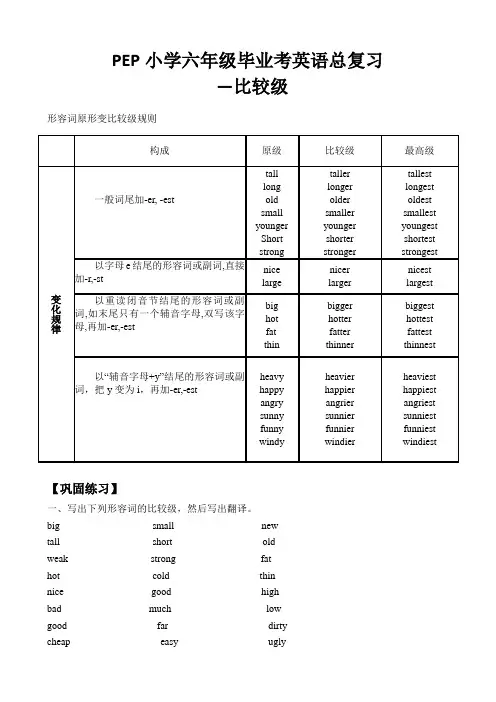
PEP小学六年级毕业考英语总复习—比较级形容词原形变比较级规则【巩固练习】一、写出下列形容词的比较级,然后写出翻译。
big ______ ______ small ______ ______ new ______ ______tall ______ ______ short______ ______ old______ ________ weak ______ ______ strong ______ ______ fat______ ________hot ______ ______ cold ______ ________ thin ______ ________nice ______ _____ good ______ ________ high______ ________bad ______ ______ much ______ ________ low______ ________ good______ ______ far ______ ________ dirty_____ ______cheap______ ______ easy ______ ________ ugly ______ ________heavy ______ ______thin ______ ________ clean_______ _______light ______ ______ slow_______ ______ fast______ ______late ______ ______ well_______ ______ cheap ______ ______ill ______ ______ excited ______ ______fat ______ ______ different ______ ______ funny ______ ______fast ______ ______ dirty ______ ______ hard ______ ______early ______ _____ tidy______ ________ bright______ ________large ______ ______ happy ______ _______ pretty______ ________young _______ _______wet _____ _______ long______ _______famous________ __________ interesting ________ __________important ________ ____________ delicious _________ __________beautiful_________________ expensive ______ ________二、根据句意填入单词的正确形式。
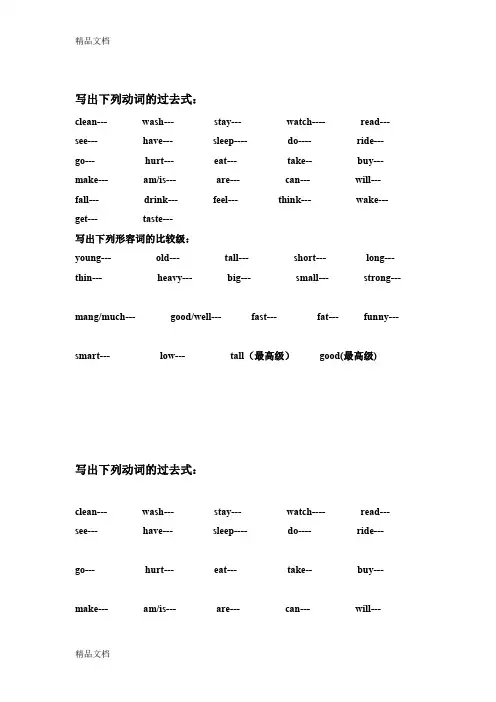
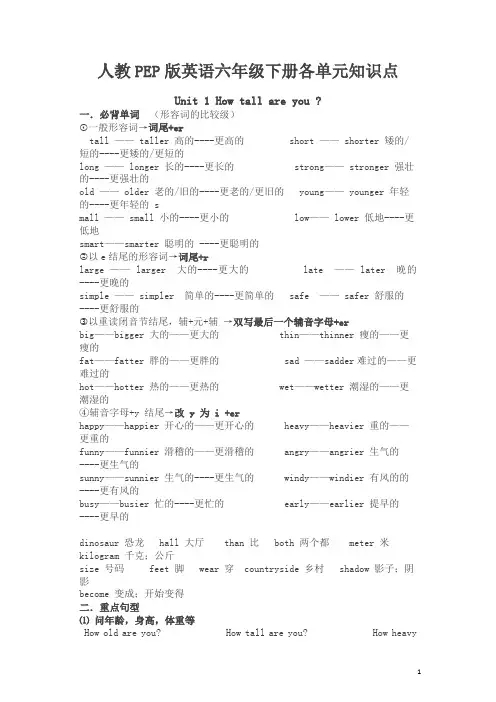
人教PEP版英语六年级下册各单元知识点Unit 1 How tall are you ?一.必背单词(形容词的比较级)①一般形容词→词尾+ertall —— taller 高的----更高的 short —— shorter 矮的/短的----更矮的/更短的long —— longer 长的----更长的 strong—— stronger 强壮的----更强壮的old —— older 老的/旧的----更老的/更旧的 young—— younger 年轻的----更年轻的 small —— small 小的----更小的 low—— lower 低地----更低地smart——smarter 聪明的 ----更聪明的②以e结尾的形容词→词尾+rlarge —— larger 大的----更大的 late —— later 晚的----更晚的simple —— simpler 简单的----更简单的 safe —— safer 舒服的----更舒服的③以重读闭音节结尾,辅+元+辅→双写最后一个辅音字母+erbig——bigger 大的——更大的 thin——thinner 瘦的——更瘦的fat——fatter 胖的——更胖的 sad ——sadder难过的——更难过的hot——hotter 热的——更热的 wet——wetter 潮湿的——更潮湿的④辅音字母+y 结尾→改 y 为 i +erhappy——happier 开心的——更开心的 heavy——heavier 重的——更重的funny——funnier 滑稽的——更滑稽的 angry——angrier 生气的----更生气的sunny——sunnier 生气的----更生气的 windy——windier 有风的的----更有风的busy——busier 忙的----更忙的 early——earlier 提早的----更早的dinosaur 恐龙 hall 大厅 than 比 both 两个都 meter 米kilogram 千克;公斤size 号码 feet 脚 wear 穿 countryside 乡村 shadow 影子;阴影become 变成;开始变得二.重点句型⑴ 问年龄,身高,体重等How old are you? How tall are you? How heavyare you?--- I’m _______ (years old). --- I’m ______metres tall. ---- I’m ______ kilograms .⑵ 问物品的情况:① How large is your room? 你的房间有多大?It’s ______ m (square meters.) 有___平方米。
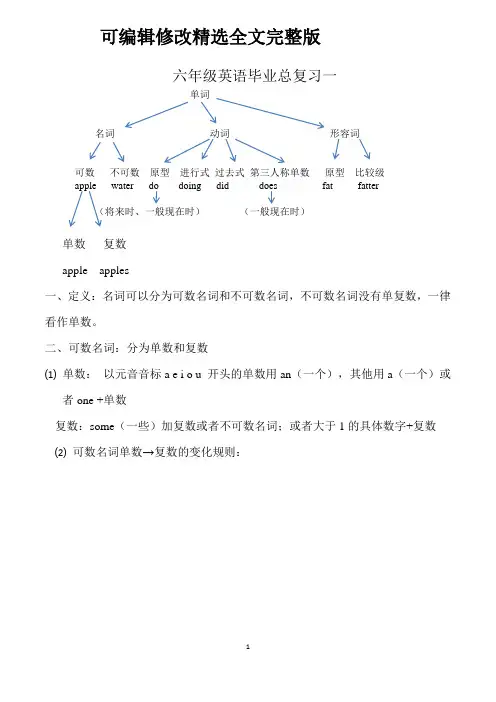
可编辑修改精选全文完整版六年级英语毕业总复习一单词名词动词形容词可数不可数原型进行式过去式第三人称单数原型比较级apple water do doing did does fat fatter(将来时、一般现在时)(一般现在时)单数复数apple apples一、定义:名词可以分为可数名词和不可数名词,不可数名词没有单复数,一律看作单数。
二、可数名词:分为单数和复数⑴单数:以元音音标a e i o u 开头的单数用an(一个),其他用a(一个)或者one +单数复数:some(一些)加复数或者不可数名词;或者大于1的具体数字+复数⑵可数名词单数→复数的变化规则:三、不可数名词:以下词为常为不可数名词,他们的复数形式就是他们本身。
water 水milk牛奶tea 茶rice米饭juice 果汁bread面包meat 肉四、人称代词:be 动词am , is , are的选择: 单数用is , 复数用are,I 用am , you 用are.练习题一、选择a或an或some.pen bag apple big applebananas orange books water二、写出下列各词的复数.watch _______ child _______ day________ foot________ book_______ sheep ______ box_______ peach______ man______fish _______ paper_______三、选择:1、There on the wall .They are very beautiful.A. are photoesB. are photos2、That’s book.A. anB. a3、There some in the river.A. are, fishesB. are ,fish4. Would you like _______ ,please?A. some watersB. some water5、Do you want to drink much ?A、a milkB、milk四、选择be(am is are ) 填空。
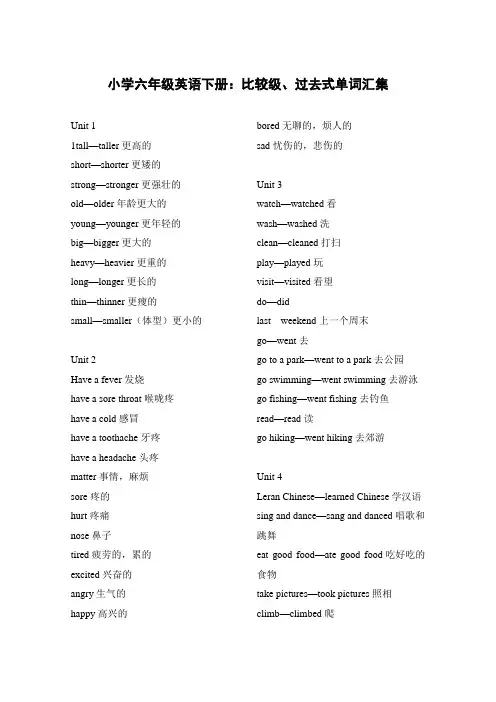
小学六年级英语下册:比较级、过去式单词汇集Unit 11tall—taller更高的short—shorter更矮的strong—stronger更强壮的old—older年龄更大的young—younger更年轻的big—bigger更大的heavy—heavier更重的long—longer更长的thin—thinner更瘦的small—smaller(体型)更小的Unit 2Have a fever发烧have a sore throat喉咙疼have a cold感冒have a toothache牙疼have a headache头疼matter事情,麻烦sore疼的hurt疼痛nose鼻子tired疲劳的,累的excited兴奋的angry生气的happy高兴的bored无聊的,烦人的sad忧伤的,悲伤的Unit 3watch—watched看wash—washed洗clean—cleaned打扫play—played玩visit—visited看望do—didlast weekend上一个周末go—went去go to a park—went to a park去公园go swimming—went swimming去游泳go fishing—went fishing去钓鱼read—read读go hiking—went hiking去郊游Unit 4Leran Chinese—learned Chinese学汉语sing and dance—sang and danced唱歌和跳舞eat good food—ate good food吃好吃的食物take pictures—took pictures照相climb—climbed爬have—had buy presents—bought presents买礼物row a boat—rowed a boat 划船see elephant—saw elephant 看大象go skiing—went skiing去滑雪go ice-skating—went ice-skating去滑冰how怎么,如何get—got到达last 上一个的。
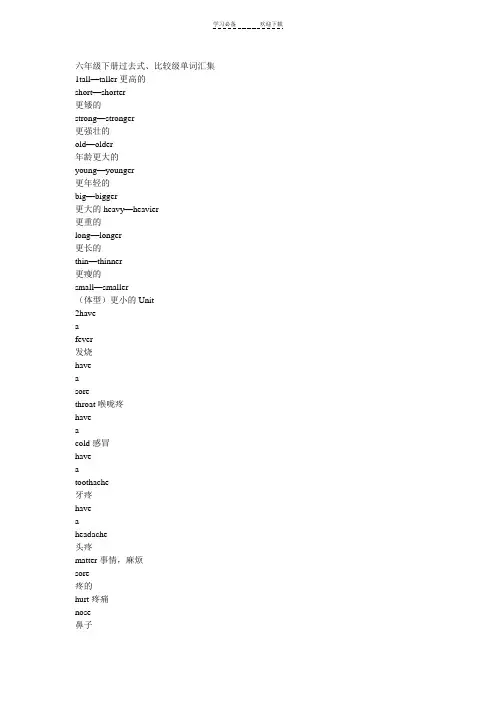
六年级下册过去式、比较级单词汇集1tall—taller更高的short—shorter更矮的strong—stronger更强壮的old—older年龄更大的young—younger更年轻的big—bigger更大的heavy—heavier更重的long—longer更长的thin—thinner更瘦的small—smaller(体型)更小的Unit2haveafever发烧haveasorethroat喉咙疼haveacold感冒haveatoothache牙疼haveaheadache头疼matter事情,麻烦sore疼的hurt疼痛nose鼻子tired疲劳的,累的excited兴奋的angry生气的happy高兴的bored无聊的,烦人的sad忧伤的,悲伤的Unit 3watch—watched看wash—washed洗clean—cleaned打扫play—played玩visit—visited看望do—didlastweekend上一个周末go—went去gotoapark—wenttoapark去公园go swimming—went swimming去游泳gofishing—went fishing去钓鱼read—read读gohiking—wenthiking去郊游Unit4leran Chinese—learned Chinese学汉语singand dance—sanganddanced唱歌和跳舞eatgoodfood—ategoodfood吃好吃的食物take pictures—took pictures照相climb—climbed爬have—hadbuy presents—bought presents买礼物rowaboat—rowedaboat划船see elephant—saw elephant看大象goskiing—went skiing去滑雪goice-skating—went ice-skating去滑冰how怎么,如何get—got到达last上一个的。
Unit 1 How tall are you?重点词汇:1、Younger 更年轻的young的比较级young 的最高级?例句:我的妈妈比爸爸更年轻。
2、older 更年长的old的比较级old的最高级?elder eldest 例句:汤姆比吉姆更年长。
3、taller 更高的tall 的比较级tall的最高级?例句:我比我的弟弟高。
4、shorter 更矮的,更短的short的比较级,short的最高级?例句:这把尺子比那把尺子短。
5、longer 更长的long的比较级例句:她的头发比我的长。
6、thinner 更瘦的thin的比较级反义词?例句:这只猴子比大象瘦7、heavier 更重的heavy的比较级反义词?例句:迈克比他妹妹更重。
8、bigger 更大的big的比较级反义词?例句:这只兔子比那只兔子大的多。
This rabbit is much bigger than that one .9、smaller 更小的small 的比较级例句:我的梨子比你的小。
My pear is smaller than yours.10、strong 更强壮的strong的比较级反义词?例句:我哥哥比我强壮。
11、countryside n. 不可数名词乡村同义词:例句:我的祖父母生活在一个小乡村。
12、lower 更低的low的比较级反义词?例句:这栋楼比那栋楼低。
This building is lower than that one.13、shadow n. 可数名词阴影,影子例句:你能看到你的影子吗?14、smarter 更聪明的smart的比较级例句:你变得越来越聪明了。
You are getting smarter and smarter.15、become v. 开始变得,变成例句:这个女孩想成为一名演员。
This girl wants to become an actress.重点短语:How tall 多高how heavy 多重how old 多大what size 多大号In this hall 在这个厅里both of 两个都over there 在那边have a look 看一看Go down 下降重点句型:①形容词的最高级:最高级通常用于3人或者3人以上的人或事物之间的比较。
六年级下册英语必考知识点一、词汇。
1. 形容词比较级和最高级。
- 比较级的构成:- 一般在词尾加 -er,如tall - taller,short - shorter。
- 以e结尾的形容词,直接加 -r,如nice - nicer。
- 重读闭音节且末尾只有一个辅音字母,双写这个辅音字母再加 -er,如big - bigger。
- 以“辅音字母 + y”结尾的形容词,把y变为i再加 -er,如heavy - heavier。
- 最高级的构成:- 一般在词尾加 -est,如tall - tallest。
- 以e结尾的形容词,直接加 -st,如nice - nicest。
- 重读闭音节且末尾只有一个辅音字母,双写这个辅音字母再加 -est,如big - biggest。
- 以“辅音字母 + y”结尾的形容词,把y变为i再加 -est,如heavy - heaviest。
- 不规则变化:- good/well - better - best.- bad/badly - worse - worst.- many/much - more - most.- little - less - least.2. 动词的过去式。
- 规则变化:- 一般在词尾加 -ed,如play - played,clean - cleaned。
- 以e结尾的动词,加 -d,如live - lived。
- 重读闭音节且末尾只有一个辅音字母,双写这个辅音字母再加 -ed,如stop - stopped。
- 以“辅音字母 + y”结尾的动词,把y变为i再加 -ed,如study - studied。
- 不规则变化:- go - went.- see - saw.- eat - ate.- have/has - had等。
3. 重点单词。
- 职业类:doctor(医生),teacher(教师),pilot(飞行员),scientist (科学家),artist(艺术家)等。
六年级下册英语书笔记六年级下册英语(人教版)笔记。
一、Unit 1 How tall are you?(一)重点单词。
1. 形容词比较级。
- taller(更高的):tall的比较级形式,用于两者身高的比较,例如:He is taller than me.(他比我高。
)- shorter(更矮的;更短的):short的比较级,可形容身高或者物体的长短,如:My pencil is shorter than yours.(我的铅笔比你的短。
)- longer(更长的):long的比较级,例如:The river is longer than that one.(这条河比那条河长。
)- older(更年长的):old的比较级,用于比较年龄大小,如:My sister is older than me.(我姐姐比我大。
)- younger(更年轻的):young的比较级,例如:He looks younger than his real age.(他看起来比实际年龄年轻。
)- stronger(更强壮的):strong的比较级,如:The elephant is stronger than the bear.(大象比熊强壮。
)2. 其他单词。
- centimeter(厘米):长度单位,缩写为“cm”,例如:I am 150 centimeters tall.(我身高150厘米。
)- meter(米):长度单位,缩写为“m”,如:The building is 50 meters high.(这栋楼50米高。
)- kilogram(千克;公斤):重量单位,缩写为“kg”,例如:This bag weighs 5 kilograms.(这个包重5公斤。
)(二)重点句型。
1. 询问身高、长度等。
- How tall are you?(你有多高?)- I'm 1.65 meters.(我身高1.65米。
六年级英语重点单词过去式过去式(Past tense)是英语语法中的一个重要概念。
在六年级英语学习中,学生们需要掌握一系列常见动词的过去式形式。
过去式是表示过去发生的动作、事情或状态的形式。
以下将详细介绍几个常见的六年级英语重点单词的过去式形式。
1. go – went"go"意思是“去”。
它的过去式形式是"went"。
例如:I went to the park yesterday.(我昨天去了公园。
)2. eat – ate"eat"意思是“吃”。
它的过去式形式是"ate"。
例如:She ate an apple for breakfast.(她早餐吃了一个苹果。
)3. drink – drank"drink"意思是“喝”。
它的过去式形式是"drank"。
例如:They drank some waterafter playing soccer.(他们踢完足球后喝了些水。
)4. see – saw"see"意思是“看到”。
它的过去式形式是"saw"。
例如:He saw a bird in the tree.(他在树上看到了一只鸟。
)5. do – did"do"意思是“做”。
它的过去式形式是"did"。
例如:We did our homework together.(我们一起做作业。
)6. have – had"have"意思是“有”。
它的过去式形式是"had"。
例如:She had a great time at the party.(她在派对上过得很开心。
)7. make – made"make"意思是“制作”。
它的过去式形式是"made"。
(word完整版)小学英语单词的过去式和比较级单词编辑整理:尊敬的读者朋友们:这里是精品文档编辑中心,本文档内容是由我和我的同事精心编辑整理后发布的,发布之前我们对文中内容进行仔细校对,但是难免会有疏漏的地方,但是任然希望((word完整版)小学英语单词的过去式和比较级单词)的内容能够给您的工作和学习带来便利。
同时也真诚的希望收到您的建议和反馈,这将是我们进步的源泉,前进的动力。
本文可编辑可修改,如果觉得对您有帮助请收藏以便随时查阅,最后祝您生活愉快业绩进步,以下为(word完整版)小学英语单词的过去式和比较级单词的全部内容。
小学英语单词的过去式am, is -—-— was are ———— were do———- did;go-—-- went say—-——saidwrite---- wrote;get--—— got live—-——lived like——--liked;love---- loved;come--——came; help—-—- helped;finish—--—finished clean---- cleaned; wash————washed cook-—-—cooked;listen----listened play--—- played phone———-phoned paint——-— painted watch——--watched learn——learnt/learnedwalk--——walked;take-—--tookride-——— rode;stay-—-—stayed;talk--——talked swim---—swam; invent—-——invente d print -——printed;look-—--looked;make———- made;climb--—-climbed;buy---- bought;have---- had; eat—-—— ate;see--—- saw;fall---—fell;wear----wore; drink-———drunk; break—--—broke want-—--wanted;run-—-—ran;give--——gave;kiss---—kissed;put—---put;practice----practice d win----won;visit---—visited;happen———-happene d;bump--—-bumped; cut——-—cut;hurt--——hurt; knock--——knocked; tell-——- told ; come —--—camedo ——--did draw-—-—drewdrink-—-—drank drive —-—-drovefall ————fell feed —--—fedfeel —-——felt find ————foundfly ————flew forget-—--forgotget-—--gotgo —-——went have ,has--——hadhear----heardhold —-——held keep-——-keptknow —-—-knew learn —-—-learnt,leave-——-left let —--—letmake ———-made may ——--mightmean —---meant meet —--—metmust————must put--—-put read—--—read ride--——rode ring--——rang run—--—ran say-—-—said see——--saw sell-——-sold shall—should sing-—-—sang sit—--—sat sleep—-——slept speak——-—spoke stand--—-stood swim-——-swam take—--—took teach---—taught tell——--told think-—--thought throw—-——threw will-would write—wrote1.在形容词词尾加上“er” “est” 构成比较级、最高级:bright(明亮的)—brighter—brightestbroad(广阔的)-broader-broadestcheap(便宜的)—cheaper—cheapest clean(干净的)—cleaner—cleanest clever(聪明的)—cleverer—cleverest cold(寒冷的)-colder-coldestcool(凉的)—cooler—coolestdark(黑暗的)—darker—darkestdear(贵的)—dearer—dearestdeep(深的)-deeper—deepestfast(迅速的)-faster—fastestfew(少的)—fewer-fewestgreat(伟大的)—greater—greatest hard(困难的,硬的)—harder—hardest high(高的)—higher—highestkind(善良的)-kinder-kindestlight(轻的)—lighter—lightestlong(长的)-longer—longestloud(响亮的)—louder-loudestlow(低的)—lower—lowestnear(近的)—nearer—nearestnew(新的)—newer-newestpoor(穷的)—poorer—poorestquick(快的)—quicker-quickestquiet(安静的)—quieter—quietestrich(富裕的)-richer—richestshort(短的)—shorter—shortestslow(慢的)—slower—slowestsmall(小的)—smaller—smallestsmart(聪明的)-smarter—smartestsoft(柔软的)—softer—softeststrong(强壮的)—stronger—strongest sweet(甜的)—sweeter-sweetesttall(高的)—taller—tallestthick(厚的)-thicker-thickestwarm(温暖的)—warmer—warmestweak(弱的)—weaker—weakestyoung(年轻的)—younger—youngest2。